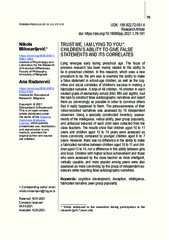Приказ основних података о документу
Trust Me, I am Lying to You: Children’s Ability to Give False Statements and Its Correlates
| dc.contributor | Smederevac, Snežana | |
| dc.creator | Milosavljević, Nikola | |
| dc.creator | Radanović, Ana | |
| dc.date.accessioned | 2021-06-02T11:52:33Z | |
| dc.date.available | 2021-06-02T11:52:33Z | |
| dc.date.issued | 2021 | |
| dc.identifier.issn | 1821-0147 | |
| dc.identifier.uri | http://ipir.ipisr.org.rs/handle/123456789/474 | |
| dc.description.abstract | Lying emerges early during preschool age. The focus of previous research has been mainly related to the ability to lie in preschool children. In this research, which uses a new procedure to lie, the aim was to examine the ability to make a false statement in school-age children, as well as the cognitive and social correlates of children's success in making a fabricated narrative. A total of 48 children, 16 children in each studied grade of elementary school (first, fifth and eighth), had the task to construct false autobiographic narratives and report them as convincingly as possible in order to convince others that it really happened to them. The persuasiveness of their video-recorded narratives was assessed by 15 independent observers. Using a specially constructed inventory, assessments of the intelligence, verbal ability, peer group popularity, and antisocial behavior of each child were collected from the class teachers. The results show that children aged 10 to 11 years and children aged 13 to 14 years were assessed as more convincing compared to younger children aged 6 to 7 years. However, there was no difference in the ability to make a fabricated narrative between children aged 10 to 11 and children aged 13 to 14, nor a difference in this ability between girls and boys. Children with higher school achievement and those who were assessed by the class teacher as more intelligent, verbally capable, and more popular among peers were also assessed as more convincing by the group of independent assessors while reporting false autobiographic narratives. | sr |
| dc.language.iso | en | sr |
| dc.publisher | Novi Sad : Filozofski fakultet | sr |
| dc.relation | info:eu-repo/grantAgreement/MESTD/inst-2020/200018/RS// | sr |
| dc.relation | info:eu-repo/grantAgreement/MESTD/Basic Research (BR or ON)/179018/RS// | sr |
| dc.rights | openAccess | sr |
| dc.rights.uri | https://creativecommons.org/licenses/by/4.0/ | |
| dc.source | Primenjena Psihologija | sr |
| dc.subject | cognitive development | sr |
| dc.subject | deception | sr |
| dc.subject | intelligence | sr |
| dc.subject | fabricated narrative | sr |
| dc.subject | peer group popularity | sr |
| dc.title | Trust Me, I am Lying to You: Children’s Ability to Give False Statements and Its Correlates | sr |
| dc.type | article | sr |
| dc.rights.license | BY | sr |
| dc.citation.epage | 101 | |
| dc.citation.issue | 1 | |
| dc.citation.rank | M23 | |
| dc.citation.spage | 79 | |
| dc.citation.volume | 14 | |
| dc.identifier.doi | https://doi.org/10.19090/pp.2021.1.79-101 | |
| dc.identifier.fulltext | http://ipir.ipisr.org.rs/bitstream/id/1217/Trust_me_I_am_lying_to_you_2021.pdf | |
| dc.type.version | publishedVersion | sr |

